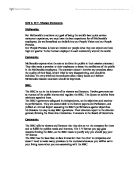No Promises In The Wind Essay: Radio In The 1930’s
Spencer LaBute
8th Grade English, Period 3
Mrs. Gordon
March 17, 2005
People in the 1930’s were heavily influenced by the radio. By 1939, almost everybody in America owned a radio. A family sitting around the radio, listening to a comedy routine or the news became commonplace. One of the things that appealed most to listeners was that there were many different things to listen to. Some of the daily programming on the radio included soap operas, adventure stories, news reports, public speeches, and comedians. People liked that they could get entertainment in their house instead of having to travel to the movie theater, the circus, or any other entertaining venue. Convenience played a major part in the popularity growth of radios.
Radio was the most important new form of entertainment in the first half of the twentieth century. In 1930, almost fifteen million families owned a radio and that number had doubled by 1940. Some of the most listened to programming was the variety shows and comedic sitcoms. Amos ‘n’ Andy, a popular radio sitcom, starred Freeman Gosden and Charles Correll. These actors were former vaudeville performers. During the harsh times the nation was facing, even a 15 minute show could bring comic relief to the American population. The War Of The Worlds, by Orson Welles, caused an on-air and off-air commotion. The night that CBS’s Mercury Theater of the Air, a broadcast drama based on Orson Welles’ book premiered, people were struck with fear about the story of Martians invading Earth. Thousands of phone calls were made to CBS, newspaper offices, and police stations. This panic got out of hand and shortly after the fake news broadcasts, the FCC conducted hearings and passed laws and regulated that no fake news was to be reported. The following quote shows the lasting impression of the radio; “There







